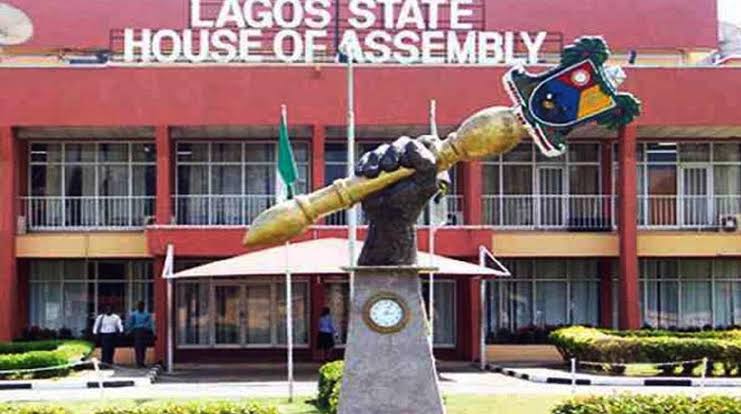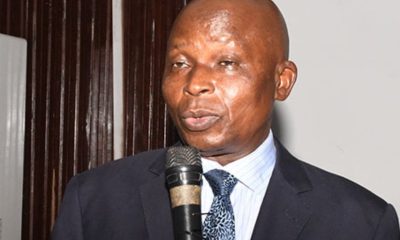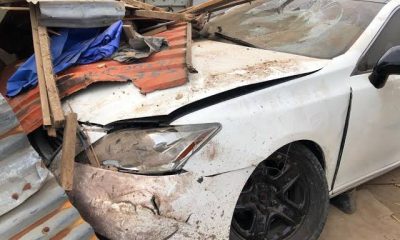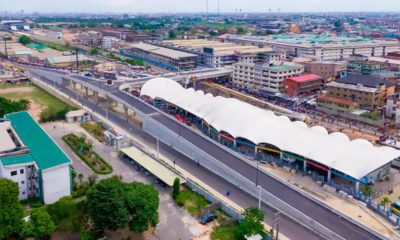Headline
Lagos Assembly rejects 17 commissioner nominees, confirms 22

The Lagos State House of Assembly has rejected 17 commissioner nominees of Gov. Babajide Sanwo-Olu, including former commissioner for health, Prof. Akin Abayomi and former commissioner for information, Mr Gbenga Omotosho.
The lawmakers, however, confirmed 22 other commissioner nominees of the governor.
The exercise, which was done through a voice vote, was sequel to the screening of the nominees at the assembly’s Committee of the Whole at plenary.
The Speaker, Mr Mudashiru Obasa, who presided over it, said the exercise followed a rigorous and detailed screening of the nominees by an ad-hoc committee led by the Chief Whip, Mr Fatai Mojeed.
Obasa said the exercise was in line with Section 182 Sub-Section I and II of the Constitution of the Federal Republic of Nigeria.
The speaker said the other 15 nominees rejected were as follows: Mrs Folashade Adefisayo, Mr Yomi Oluyomi, Mrs Folashade Ambrose, Ms Barakat Bakare, Olalere Odusote, Dr Rotimi Fashola, Mrs Bolaji Dada.
According to him, others rejected include: Mr Sam Egube, Mr Olalekan Fatodu, Mrs Solape Hammond, Mr Mosopefolu George, Mrs Aramide Adeyoye, Mr Seun Osiyemi, Mr Rotimi Ogunwuyi and Dr Olumide Oluyinka
Obasa listed the 22 confirmed nominees as: Mr Layode Ibrahim, Mr Mobolaji Ogunlende, Dr Dolapo Fasawe, Ms Bola Olumegbon, Mr Idris Aregbe, Ms Abisola Olusanya, and Mr Moruf Fatai.
“Other nominees confirmed are Mr Kayode Bolaji-Roberts, Mr Abiola Olowu, Mrs Toke Benson-Awoyinka, Dr Oreoluwa Finnih- Awokoya, Mr Yakub Alebiosu, Mr Lawal Pedro, Mr Tunbosun Alake.
“Also confirmed are Mr Gbenga Oyerinde, Dr Adekunle Olayinka, Dr Jide Babatunde, Mr Afolabi Ayantayo, Mr Tokunbo Wahab, Mr Olakunle Rotimi-Akodu, Mr Jamiu Alli-Balogun and Mr Abdulkabir Ogungbo.
The speaker commended the committee for its effectiveness and urged the confirmed nominees to always remember that they were in office to serve the people of the state and not individuals.
He also promised that the assembly would continue to do its best in the interest of the state.
The speaker, therefore, directed the Clerk of the House, Mr Lekan Onafeko, to communicate the notice of the confirmation and rejection of the nominees to the governor.
The speaker did not give any reason why the assembly rejected the nominees.
Headline
Fagbemi warns against obstructing EFCC from performing its lawful duty

The Minister of Justice, Lateef Fagbemi, SAN has warned against obstructing the Economic and Financial Crimes Commission (EFCC) from carrying out its lawful duty .
Fagbemi’s warning is contained in a statement in Abuja.
“This is a matter of very grave concern, it is now beyond doubt that the EFCC is given power by the law to invite any person of interest to interact with them in the course of their investigations into any matter, regardless of status.
“Therefore, the least that we can all do when invited, is not to put any obstruction in the way of EFCC, but to honourably answer their invitation.
“A situation where public officials who are themselves subject of protection by law enforcement agents will set up a stratagem of obstruction to the civil and commendable efforts of the EFCC to perform its duty is to say the least, insufferably disquieting’’.
He added that running away from the law will not resolve issues at stake but only exacerbate them.
“Nigeria has a vibrant judicial system that is capable of protecting everyone who follows the rule of law in seeking protection.
“I therefore encourage anyone who has been invited by the EFCC or any other agency to immediately toe the path of decency and civility by honouring such invitation instead of embarking on a temporising self-help and escapism.
“This can only put our country in bad light before the rest of the world’’.
He said institutions of state should be allowed to function effectively and efficiently.
“I stand for the rule of law and will promptly call EFCC, and indeed any other agency to order when there is an indication of any transgressions of the fundamental rights of any Nigerian by any of the agencies’’.
NAN reports that the EFCC had on Wednesday warned members of the public that it was a criminal offence to obstruct officers of the Commission from carrying out their lawful duties.
Section 38(2)(a(b) of the EFCC Establishment Act makes it an offence to prevent officers of the Commission from carrying out their lawful duties. Culprits risk a jail term of not less than five years.
The warning , the EFCC said, became necessary against the background of the increasing tendency by persons and groups under investigation by the Commission to take the laws into their hands by recruiting thugs to obstruct lawful operations of the EFCC.
On several occasions, the anti graft agency said, operatives of the Commission have had to exercise utmost restraint in the face of such provocation to avoid a breakdown of law and order.
Headline
Unknown Gunmen Abduct Channelstv Reporter In Port-harcourt

Some unknown gunmen have kidnapped Joshua Rogers, the ChannelsTV reporter in Port-Harcourt, the Rivers State capital.
Politics Nigeria learnt that Rogers was picked up close to his residence at Rumuosi in Port Harcourt and to an unknown destination by the gunmen around 9pm on Thursday, April 11.
The reporter was driving his official ChannelsTV branded car when the hoodlums accosted, pointed a gun at him and took him away in the same vehicle.
Rogers was said to be returning from his official assignment in Government House after a trip to Andoni for a government event when the incident happened.
Already, the gunmen were said to have contacted his wife and demanded a N30million ransom for bis release.
His cameraman confirmed the incident and appealed to his abductors to set him free unconditionally.
-

 Business6 days ago
Business6 days agoSeplat Energy celebrates a decade of Dual Listing with Bell Ringing Ceremony at Nigerian Stock Exchange
-

 News6 days ago
News6 days agoBDCs now buying dollar at ₦980 — ABCON President
-

 Metro6 days ago
Metro6 days agoOsun Poly Student, Olanrewaju Olatona killed by hit-and-run one-way driver
-

 Headline6 days ago
Headline6 days agoFagbemi warns against obstructing EFCC from performing its lawful duty
-

 News6 days ago
News6 days agoLASG’s maize palliative impactful, says poultry association chair
-

 News6 days ago
News6 days agoWoman killed while crossing road in Anambra












